
Mao Zedong, also known as Chairman Mao, was a Chinese politician, revolutionary, and political theorist who founded the People's Republic of China (PRC) and led the country from its establishment in 1949 until his death in 1976. Mao served as the chairman of the Chinese Communist Party (CCP) from 1943 until his death, and as the party's de facto leader from 1935. His theories, which he advocated as a Chinese adaptation of Marxism–Leninism, are known as Maoism.

Maoism, officially Mao Zedong Thought, is a variety of Marxism–Leninism that Mao Zedong developed while trying to realize a socialist revolution in the agricultural, pre-industrial society of the Republic of China and later the People's Republic of China. A difference between Maoism and traditional Marxism–Leninism is that a united front of progressive forces in class society would lead the revolutionary vanguard in pre-industrial societies rather than communist revolutionaries alone. This theory, in which revolutionary praxis is primary and ideological orthodoxy is secondary, represents urban Marxism–Leninism adapted to pre-industrial China. Later theoreticians expanded on the idea that Mao had adapted Marxism–Leninism to Chinese conditions, arguing that he had in fact updated it fundamentally and that Maoism could be applied universally throughout the world. This ideology is often referred to as Marxism–Leninism–Maoism to distinguish it from the original ideas of Mao.

Jiang Qing, also known as Madame Mao, was a Chinese communist revolutionary, actress, and political figure. She was the fourth wife of Mao Zedong, the Chairman of the Communist Party and Paramount leader of China. Jiang was best known for playing a major role in the Cultural Revolution as the leader of the radical Gang of Four.

Chen Duxiu was a Chinese revolutionary socialist, educator, philosopher and author, who co-founded the Chinese Communist Party (CCP) with Li Dazhao in 1921. From 1921 to 1927, he served as the Communist Party's first general secretary. Chen was a leading figure in both the Xinhai Revolution that overthrew the Qing dynasty and the May Fourth Movement for scientific and democratic developments in the early Republic of China. After his expulsion from the CCP in 1929, Chen was for a time the leader of China's Trotskyist movement.
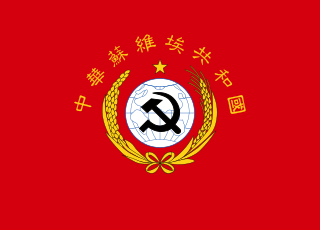
The Chinese Soviet Republic (CSR) was a state within China, proclaimed on 7 November 1931 by Chinese Communist Party (CCP) leaders Mao Zedong and Zhu De in the early stages of the Chinese Civil War. The discontiguous territories of the CSR included 18 provinces and 4 counties under the Communists' control. The CSR's government was located in its largest component territory, the Jiangxi Soviet in southeastern China, with its capital city at Ruijin. Due to the importance of the Jiangxi Soviet in the CSR's early history, the name "Jiangxi Soviet" is sometimes used to refer to the CSR as a whole. Other component territories of the CSR included the Minzhegan, Xianggan, Xiang'egang, Honghu, Xiang'echuanqian, Eyuwan, Eyushan, Shaanxi-Gansu, Sichuan-Shaanxi, and Hailufeng Soviets.
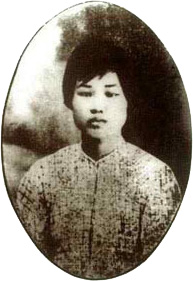
Yang Kaihui was the second wife of Mao Zedong, whom he married in 1920. She had three children with Mao Zedong: Mao Anying, Mao Anqing and Mao Anlong. Her father was Yang Changji, the head of the Hunan First Normal School and one of Mao's favorite teachers. She was a distant cousin to Yang Youlin, another instrumental member of the Chinese Communist Party.
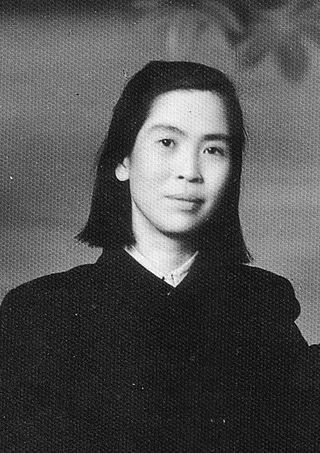
He Zizhen was a Chinese soldier, revolutionary, and politician who was the third wife of Chairman Mao Zedong from 1928 to 1937 and participated in the Long March.
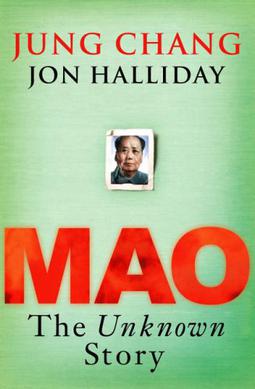
Mao: The Unknown Story is a 2005 biography of the Chinese communist leader Mao Zedong (1893–1976) that was written by the husband-and-wife team of the writer Jung Chang and the historian Jon Halliday, who detail Mao's early life, his introduction to the Chinese Communist Party, and his political career. The book summarizes Mao's transition from a rebel against the autocratic Kuomintang government to the totalitarian dictator over the People's Republic of China. Chang and Halliday heavily cover Mao's role in the planning and the execution of the Great Leap Forward and the Cultural Revolution. They open the book saying "Mao Tse-tung, who for decades held absolute power over the lives of one-quarter of the world's population, was responsible for well over 70 million deaths in peacetime, more than any other twentieth-century leader.
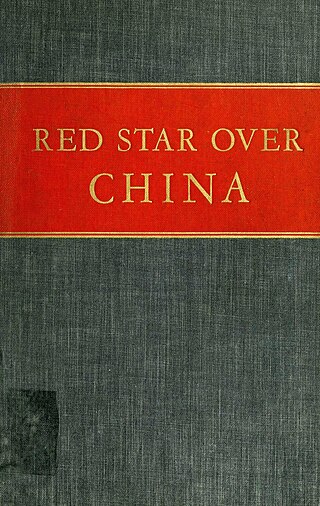
Red Star Over China is a 1937 book by Edgar Snow. It is an account of the Chinese Communist Party (CCP) that was written when it was a guerrilla army and still obscure to Westerners. Along with Pearl S. Buck's The Good Earth (1931), it was the most influential book on Western understanding of China as well as the most influential book on Western sympathy for Red China in the 1930s.
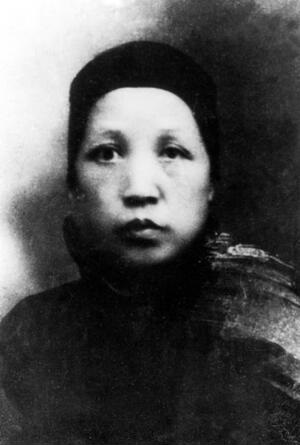
Wen Qimei was the mother of Mao Zedong.
Luo Yixiu, a Han Chinese woman, was the first wife of the later Chinese communist revolutionary and political leader Mao Zedong, to whom she was married from 1908 until her death. Coming from the area around Shaoshan, Hunan, in south central China – the same region as Mao – her family were impoverished local landowners.
Lucien André Bianco is a French historian and sinologist specializing in the history of the Chinese peasantry in the twentieth century. He is the author of a reference book on the origins of the Chinese Communist Revolution and has co-edited the book China in the twentieth century. His Peasants without the Party was awarded the Association for Asian Studies Joseph Levenson Book Prize in 2003.
Ross Gladwin Terrill was an Australian-born American political scientist and historian. He was best known for his studies in the history of China, especially the history of the People's Republic of China. He testified in front of committees of the United States Congress, and he wrote numerous articles and nine books. For many years he was a research associate at Harvard's Fairbank Center for Chinese Studies, and he was a visiting professor at the University of Texas at Austin, as well as a visiting professor at Monash University in Australia.
Lee Feigon is an American historian who specialized in the study of 20th-century Chinese history.

Mao Yichang or Mao Rensheng was a Chinese farmer and grain merchant who achieved notability as the father of Mao Zedong. The nineteenth generation of the Mao clan, he was born and lived his life in the rural village of Shaoshanchong in Shaoshan, Hunan Province.
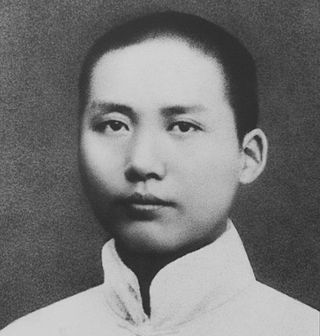
The early life of Chinese revolutionary and politician Mao Zedong covered the first 27 years of his life, from 1893 to 1919. Born in Shaoshanchong, Shaoshan in Hunan province, Mao grew up as the son of Mao Yichang, a wealthy farmer and landowner. Sent to the local Shaoshan Primary School, Mao was brought up in an environment of Confucianism, but reacted against this from an early age, developing political ideas from modern literature. Aged 13 his father organised a marriage for him with Luo Yigu, the daughter of another land-owning family, but Mao denounced the marriage and moved away from home.
The Chinese Communist Party (CCP) frames its ideology as Marxism–Leninism adapted to the historical context of China, often expressing it as socialism with Chinese characteristics. Major ideological contributions of the CCP's leadership are viewed as "Thought" or "Theory," with "Thought" carrying greater weight. Influential concepts include Mao Zedong Thought, Deng Xiaoping Theory, and Xi Jinping Thought. Other important concepts include the socialist market economy, Jiang Zemin's idea of the Three Represents, and Hu Jintao's Scientific Outlook on Development.
A Critique of Soviet Economics is a work of Marxist–Leninist political economy written by Mao Zedong. It includes a critique of two Soviet works: Economic Problems of Socialism in the USSR, a short 1951 work by Soviet leader Joseph Stalin; and Political Economy: A Textbook, an official publication of Institute of Economics of the Academy of Sciences of the Soviet Union published in 1957. First published in 1967, the book is regarded as an early polemic of the Sino-Soviet split which emerged in the late 1950s and the 1960s.
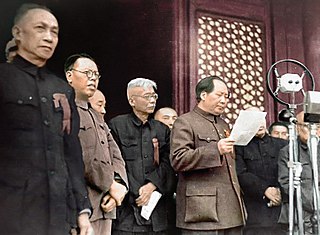
Chinese Marxist philosophy is the philosophy of dialectical materialism that was introduced into China in the early 1900s and continues in Chinese academia to the current day.
Delia Davin was a writer and lecturer on Chinese society and particularly Chinese women's stories. She was one of the first foreign scholars to consider the impact of the policies of the Chinese Communist Party on women.












